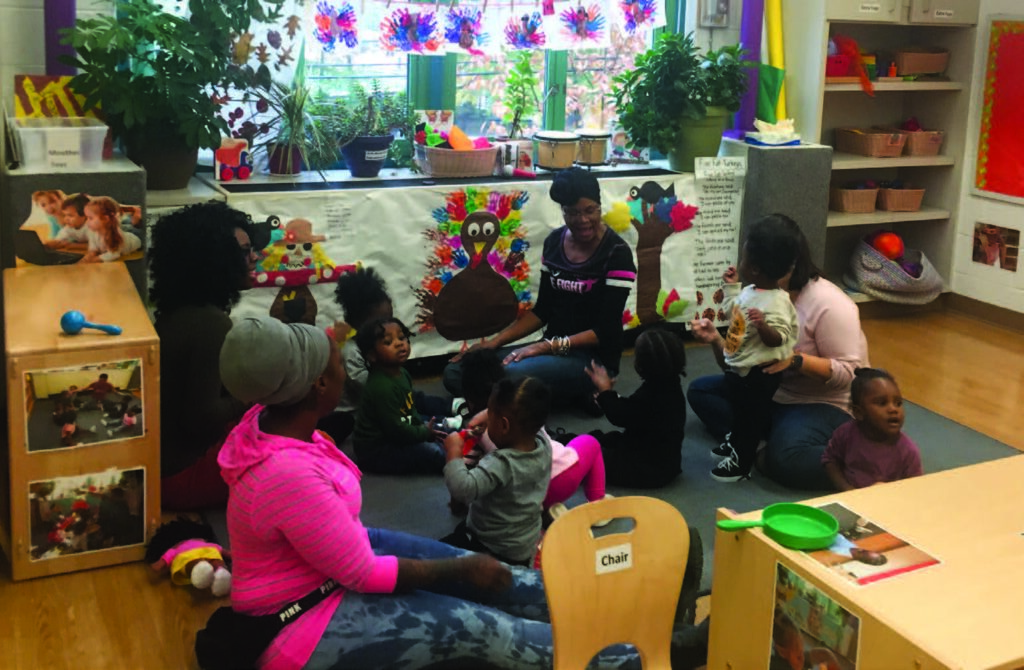The sound of children’s gleeful screams and teachers’ singing can be heard in most every room of the National Children’s Center’s Early Learning and Early Intervention Center.
There are about 180 children age 5 and under at the center and all but a few are funded through subsidies. In recent years, the organization has put a huge focus on nutritional support and education for students, including educational opportunities for children with disabilities in Wards 7 and 8. The NCC Baby Bloomers Urban Farm, where children learn how to plant and grow fruits and vegetables, is vital.
“Our goal is to share policy and practices to support the whole child,” Patricia Browne, the center’s president and CEO, wrote in an email. She pointed out that NCC is “child-centered and family-focused.”
Nutritional issues are a huge problem across D.C., especially for those in Ward 8, said Paige Pokorney, a child nutrition expert with D.C. Hunger Solutions.
“Access to good nutrition throughout [younger] years is really formative on cognitive function, on their behavior, on their ability to succeed in school,” Pokorney said. She said that early nutritional support is especially important in D.C., “where there’s so much poverty, [notably] in Wards 7 and 8 where it’s very segregated and people of color are experiencing way higher rates of nutrition-related disease and poverty.”
Obesity and diet-related diseases are a national problem, she said, and it hits some areas of D.C. hard. “It’s very racially divided here in D.C.,” Pokorney said. “A person’s rate of getting diabetes is, I want to say, 3 times more [for] someone in Ward 7 or 8 versus someone living in Ward 2 or 3.”
At the National Children’s Center, even the pickiest eaters can be taught that eating healthy is fun. Chef Nelson Molina finds creative ways to make food that appeals to kids, like carrots with honey.
Browne believes healthy eating habits should be instilled as early as possible. “For some of us, we’ve developed habits and we’re kicking and screaming our way to healthy eating. But for the children, if we can teach them now, they’ll grow with those habits embedded in them, it’ll be a part of their DNA,” Browne said. “This is an investment in the next generation.”
Consequently, the center doesn’t just provide children with nutritious food — they incorporate programs that help children and their families know the value of good nutrition on sustaining happy, healthy lives.
For example, NCC has monthly cooking classes where families learn how to recreate the healthy food the kids receive at the center so they can have it in their homes. Molina also sells and gives away produce to parents and others in a market outside the school.
“If we don’t find a way to replicate it at home, and bring the families into the loop, then the work that we’ve done with the children is for naught,” Browne said. “It’s very important that we support the families and the child so they can grow with it together.”
Almost 30% of the approximately 180 children enrolled at NCC have special needs, said Keesha Blythe, NCC Executive Director for Early Learning and Intervention. She explained that special needs children at NCC are mainstreamed, not sequestered in separate classrooms.
“Child development is not daycare,” Browne said. “it’s not babysitting — brain development happens 0-3. So, if you don’t address some of the issues at this time, by the time you go on to preschool, kindergarten, and above, you may have missed some very important milestones.”

The center has also been working on educating other organizations about how to improve their own facilities, while still brainstorming how they will improve their own work in the future –– effectively working to implement better childcare not only in D.C., but the world.
The first piece — educating other entities — comes through conducting visits with officials from other countries. Browne said NCC has welcomed international guests from Tunisia, South Korea, Egypt, and, most recently, China to tour the program and take lessons back to their respective communities.
“Inviting international visitors gives us an opportunity to learn more about the challenges and opportunities in our field globally, in addition to sharing best practices with those centers that may be impactful in their home countries,” Browne wrote.
Visiting delegates receive a tour and have a chance to inquire about the center’s cutting edge programs and see a new side of learning. The topics shared with the delegates usually center around advocacy efforts and methods of inclusion for all children, with or without disabilities.
Aside from teaching others about their successes, NCC still looks to improve internally. According to Browne, the center is in the process of building new infant and toddler suites to accommodate 56 more children, due to an initiative led by Mayor Muriel Bowser.
They’re aiming to improve educational and financial opportunities for their teachers. As required by the Office of the State Superintendent of Education, all their teachers will have an associate’s degree (AA) by 2023. Browne said they’re also pushing for funding so they can give their teachers higher pay.
“Our teachers deserve much more. If you think about some of your early teachers that really impacted your life, you probably still remember them and maybe even connect with some of them,” Browne said. “We want to make sure they’re valued appropriately so that their quality of life is good.”
Another initiative they’re exploring is hiring unemployed adults in the community to work with them in urban agriculture, which includes farming and distribution to grocery stores.
Whether educating others or working on their own initiatives, Blythe said that she hopes the center continues to grow, improve and become more of a high-quality facility.
“We’re getting there,” Blythe said with a laugh. “Started from the bottom, now we’re here.”
Correction (02.05.2020)
The article has been updated to correctly identify Paige Pokorney as an employee of D.C. Hunger Solutions — not NCC — and to specify that the Office of the State Superintendent is requiring all teachers to have at least an associate’s degree or higher by 2023, which was previously attributed as a desire or initiative of NCC.








